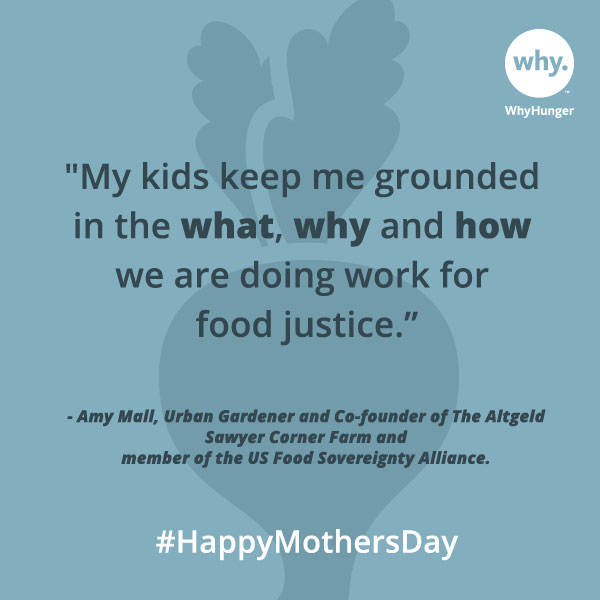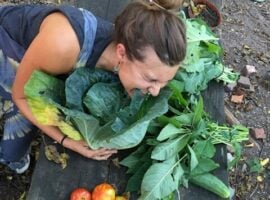We know that women are disproportionally affected by hunger around the globe and that mothers are often the ones on the frontlines leading the resistance and creating local solutions to hunger and its root causes. To recognize and honor Mother’s Day we’re highlighting a few awesome moms we know through our work in the food justice movement that are making a difference for their children and communities. Below, they share how motherhood has impacted their lives and work in the fight for nutritious food for all. Enjoy!
Amy Mall, Urban Gardener and Co-founder of The Altgeld Sawyer Corner Farm and member of the US Food Sovereignty Alliance.
How has being a mother affected your approach to and perspective of your work within food justice?
Being a mother emphasizes interdependencies as a fact and a blessing. Building a village is essential and all work towards justice is intersectional. I witness how cheap and unhealthy food finds its ways to our kids during their critical periods of growth and development and I take these policies personally. As a mother, I work to be present in everyday moments, responsive to observations, rooted in relationships and nurturing of the imaginative possibilities towards a better future. Building strong interconnected communities and interrupting false senses of isolation in a world where we have so much at shared stake is essential to how I parent. My kids keep me grounded in the what, why and how we are doing work for food justice.
Being a mother of kids with asthma has also emphasized to me the priceless importance of the work of caretakers and the economic vulnerability that follows that critical labor. Food justice work is defending the value of paid and unpaid labor that is vital to our communities’ well-being and future.
Sometimes being a mother has meant being on the periphery of many groups and more behind the scenes. I think that this has given me a deep and nuanced perspective, but I also see the need for more 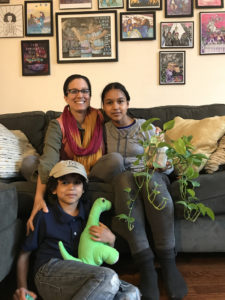 mothers to be in leadership positions or to be practically supported to step out of the sidelines. Sometimes being a mother means staying in touch with people remotely out of necessity and this can be astrength because it causes us to build with people beyond what meets the eye. I am thankful for the people that value my labor and mother the mothers.
mothers to be in leadership positions or to be practically supported to step out of the sidelines. Sometimes being a mother means staying in touch with people remotely out of necessity and this can be astrength because it causes us to build with people beyond what meets the eye. I am thankful for the people that value my labor and mother the mothers.
I build community with people that believe in the importance of mothers and children within all organizing work, especially when it is inconvenient. Family Farm Defenders, for example, has collectively considered the childcare needs of our group as a whole and group members without young children have advocated for the needs of others without being prompted because it is central to the way we see the world.
I want to give a shout out to the radical work of the Chicago Childcare Collective (ChiChiCo) that affirms that mothers, caretakers and children belong in organizing and community building spaces and all the people that have worked to develop that organization through listening to kids and mothers especially to create thoughtful, reflective and careful practices that are full of play, fun and delight. Groups like ChiChiCo are strong examples of what we need within our movement for justice in addition to economic justice for the labor of mothers. I want to also shout out the book Revolutionary Mothering as it has been a source of affirmation to me of my own ways of being and mothering. Stories of other mothers of color are a source of strength. This book also frees the perspective of “mothering” to mean more than one individual and to look at it beyond a traditional gendered basis.
There is a unique power in the organizations that welcome parents and children to organize together or that consider the needs of families in how it shares its resources, voices concerns or cares for its paid workers as people with lives and relationships that inform and strengthen an organization.
As a mom and activist, what recommendations do you have for engaging young people in the movement for a better food system?
Seek a genuine collaboration with young people that shares power and resources. Listen to young people and their families and work to notice and support their needs. Check on people; reach out to people on a personal level. Organizations come and go, it is the people that continue to collaborate within an ever-changing world in their creative work.
Let the mic be in the hands of young people. Support opportunities for young people to lead and participate. Fun, good food and art will sustain us. My daughter has translated experiences with groups like the Coalition of Immokalee Workers to other similar actions that she has chosen to be a part of.
Does your family have a favorite meal to make and eat together?
A favorite meal is one that is shared, slowed down and savored together with loved ones. Lately, on weekends, we have been making a giant Frittata with lots of good greens, eggs and potatoes in the oven. We get a chance to just relax together and enjoy. In the summer, I love making fresh hot mint chutney. My kids love it on everything.
————————————————————————————————————————————————————–
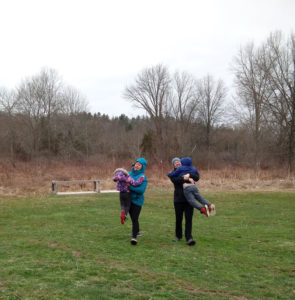 Jane Hodge and Michaela Hayes, farmers at Rise & Root Farm, Orange County, New York.
Jane Hodge and Michaela Hayes, farmers at Rise & Root Farm, Orange County, New York.
How has being a mother affected your approach to and perspective of your work within food justice?
Watching our kids light up when they see a caterpillar or taste an edible flower. Beaming with pride when we hear our 7 yr old telling school friends that he saves his orange peel to put in the compost “because we’re farmers.” Our 4 yr old at the dinner table, eating salad greens from our high tunnel at the farm, exclaiming, “this salad is so good, I can’t stop eating it!” Being at the farm, our place of work, and the kids being there with us, playing, working, and, let’s be real, arguing.
Being a foster parent means facing the hard stuff and meeting it with love. It means accepting an unconventional definition of family – one that includes the messy, complicated, changing families that we are now part of – and doing our best to remind the world that messy families are equally important and need to be acknowledged with respect. Foster parenting also means knowing there will be pain and doing it anyway because of our love for the kids and because we know that we can.
Likewise, being involved with food justice work means facing the hard stuff and meeting it with love. Accepting first that not everyone has equal access to food, especially healthy, life giving food, and that racism and poverty are central to our food system. We know that although our farm and food justice work might have a small impact, we do it anyway in the hope that the ripples will extend further. Farming is hard! We struggle with family commitments, financial instability, and ever changing weather. It might not be sustainable for us in the long term, but we’re doing it now to be the change we want to see in the world. And just maybe we’ll pull it off.
As moms and activists, what recommendations do you have for engaging young people in the movement for a better food system?
Help them spend time on a farm or in a community garden. Allow them to experience the wonder of the natural world and taste the variety of flavors of the farm or garden. Let it start there.
Introduce them to farmers, hear about farmers’ struggles and their lives, put a face on who is growing their food, seek out farmers who look like them or who are from similar backgrounds so they can see farming as a possibility for themselves and not just see it as something that other people do. Kids model what they see in adults. If you’re afraid of bugs, afraid to get dirty, not talking about injustices, they will pick up on that and absorb it. Engaging young people starts with being engaged ourselves. When we started living together with our kids, they were squeamish about bugs and not super tapped into the nature around them. Now when we go on walks, they will pick up worms, point out pineapple weed, eat what they know is edible, straight from the fields. By showing them what is important, which includes access to fresh, healthy food, we can begin to have conversations about what it means when only some people have that access.
Does your family have a favorite meal to make and eat together?
It doesn’t matter how much they love salad, pizza will forever be their favorite. So, we work around that as often as we can. When we make pizza together, we set out little bowls of toppings and they get to choose, and they know they have to choose at least one fruit or vegetable.
If we order pizza – because like most parents we are busy parents – we’ll add some kind of vegetable to the meal and they know that before they get a second slice they have to eat something fresh and healthy. It has totally paid off. The kids know that fresh produce keeps them healthy and they are used to it now and are even starting to love it.
The best meals are when we can say not only that we cooked it together but also, “we grew this salad,” and “our neighbor grew these carrots,” and “the farmer down the road raised these chickens” and on and on. We feel blessed and lucky when we know everyone who brought the food to our table.
We say a prayer of gratitude at the beginning of every meal. One of the joys of eating together has been the kids learning and saying the prayer themselves. It starts like this: “Thank you god and universe for the food we are about to eat, for the people who grew and harvested it and for the plants and animals…”
And then the eating and enjoying begins!
Rise & Root Farm is now at the Union Square Greenmarket in NYC on Fridays. Located on the west side of the park just north of 16th street. Go pick up your Mother’s Day plants and more from them!
————————————————————————————————————————————————————–
Angela Adrar, seedkeeper and Executive Director at the Climate Justice Alliance, Washington D.C.
How has being a mother affected your approach to and perspective of your work within food justice? 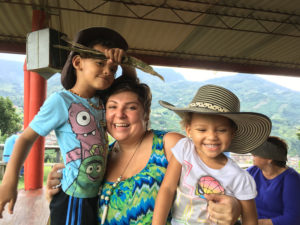
I was fortunate to have been with the Rural Coalition and La Via Campesina when I was pregnant with my two children. From the work of farmers and farmworkers, our family learned that stories of justice are woven in the patterns of our food. From the seed to the fruit, the story of our oppression and liberation are buried in the soil and with young people, ours and others, we have been able to dig our handsdeep in the dirt to unearth these stories and grow a love for food sovereignty.
Although in a city, my kids were able to grow up playing in the fields growing life and being school by the most humble and wise of the food and agriculture movement.
They just returned from a #JustRecovery food sovereignty brigade with CJA to Puerto Rico where they worked with Organisacion Boricua; in community and with other children to replant and rebuild in the aftermath of Hurricane Maria.
As a mom and activist, what recommendations do you have for engaging young people in the movement for a better food system?
My partner and I have worked with babies from 6 months to toddlers, exposing them to moist soils, the sound of water and encourage their small fingers to plant mint, lemon balm, and cilantro.
As the kids and friends got older we hold seed making jewelry sessions and play games where we blind fold kids and use their sense of touch, smell, and taste to guess aromatic herbs veggies, and fruits.
In the summer we participate in encuentros with fellow farmers and herbalists such as the one held at Centro Ashe in Southern Maryland where kids have an integrated program that runs parallel to the adult track and includes for example; the dance of the trees, herbal first aid, and the poetry of food. The love of food culture is a lifelong privilege and right and it is never too young to get in good practice.
Does your family have a favorite meal to make and eat together?
I learned to cook arepas when I was 18 after years of enjoying the cheesy arepas my maternal grandmother made with squash every holiday. Arepas from Boyaca are made with fresh corn meal and cheese. I decided it wasn’t too late to learn such a precious ancestral cuisine and spent a lot of idle time watching as my mother and aunts made oven full of arepas.
Angelica and Kingston both have learned to “masar” (knead) the arepa cornmeal through their tiny hands, making small imperfect and delicious tasting arepas that we all try to eat first. My abuelita would be proud.


